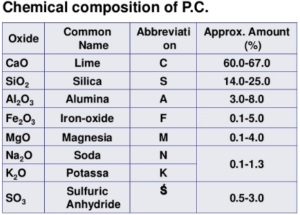Oracle IAS, the best coaching institute for UPSC/IAS/PCS preparation in Dehradun brings to you UKPCS Science Chemistry (paper 6).
Cement is a binder, a substance used in construction that sets, hardens and adheres to other materials, binding them together. Cement is seldom used solely, but is used to bind sand and gravel (aggregate) together. Cement is used with fine aggregate to produce mortar for masonry, or with sand and gravel aggregates to produce concrete.
Cements used in construction are usually inorganic, often lime or calcium silicate based, and can be characterized as being either hydraulic or non-hydraulic, depending upon the ability of the cement to set in the presence of water (see hydraulic and non-hydraulic lime plaster).
Non-hydraulic cement will not set in wet conditions or underwater; rather, it sets as it dries and reacts with carbon dioxide in the air. It is resistant to attack by chemicals after setting.
Hydraulic cements (e.g., Portland cement) set and become adhesive due to a chemical reaction between the dry ingredients and water.
Portland cement is by far the most common type of cement in general use around the world. This cement is made by heating limestone (calcium carbonate) with other materials (such as clay) to 1450 °C in a kiln, in a process known as calcination, whereby a molecule of carbon dioxide is liberated from the calcium carbonate to form calcium oxide, or quicklime, which then chemically combines with the other materials that have been included in the mix to form calcium silicates. The resulting hard substance, called ‘clinker’, is then ground with a small amount of gypsum into a powder to make ‘ordinary Portland cement’
ENVIORNMENTAL IMPACT:
Cement manufacture causes environmental impacts at all stages of the process. These include emissions of airborne pollution in the form of dust, gases, noise and vibration when operating machinery and during blasting in quarries, and damage to countryside from quarrying. Apart from it the cement production leads to release of huge amount of carbon dioxide and heavy metal in the air.
Printed notes topic wise – Contact us
Cost- Rs.5000/- (including shipping)
(~2500+ pages)
UKPCS Mains Study Material subject wise
The notes are strictly as per UKPCS syllabus (topic wise):
Individual Polity Cost: Rs. 1500/- (including shipping)
Individual S&T Cost: Rs. 1500/- (including shipping)
Individual Geography Cost: Rs. 1500/- (including shipping)
Individual Economics Cost: Rs. 1000/- (including shipping)
Individual Ethics Cost: Rs. 1000/- (including shipping)
Individual History Cost: Rs. 1500/- (including shipping)
Contact us for:-
-
-
-
-
-
-
- Upper Mains UKPCS Classroom program
- UKPCS Upper Test Series
- UKPCS Lower Test Series
- UKPCS Lower Classes
- UKPCS Past year papers
- Phone Number:–9997453844
- Telegram channel : click here
-
-
-
-
-
- UKPSC प्रारंभिक परीक्षा स्टडी मटेरियल 2026 (Upper & Lower) | Oracle IAS - January 3, 2026
- UKPCS 2026 प्री परीक्षा कोर्स : छात्रवृत्ति टेस्ट: Oracle IAS - December 30, 2025
- UKPSC 2026 के लिए उत्तराखंड प्रारंभिक परीक्षा कोर्स 2026 || Oracle IAS - December 15, 2025
